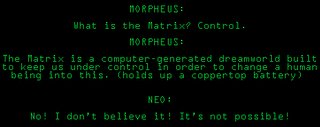In epistemology (theory of knowledge), we seek to find a criteria for what counts as knowledge. Obviously, what counts as knowledge must at least be:
1. True
2. Believed
For example, consider the statement: "Grace Baptist Church is located at 17 Mattar Rd." If a person knows this, it means that it must first be true, and the person himself/herself must belief this statement.
But problem is that those 2 conditions are clearly necessary but NOT sufficient. There is something about knowledge, such that we distinguish it from mere lucky guesses. For example, a madman thinks that the address of every single church is at 17 Mattar Rd. Obviously, in the case of Grace Baptist Church, he happens to be correct. But so what? Does he really know anything? Isn't it just a lucky belief?
Thus, we need a third criterion - that something that makes a belief worth believing in. For the above example, we can say that a person only truly knows if he has a good reason for believing in the statement, such as checking the Singapore Street Directory.
The biggest problem in philosophy of knowledge (epistemology), is to find this elusive something that makes a mere true belief become knowledge.
Many suggestions have been put forward as to what something may be. The most obvious is simply good reason that the person has access to. But then comes another problem!
Let's say I tell you I believe something. Let that belief be represented by P (e.g. cats are mammals). You may then ask, why do you believe that P? I will probably give you a reason Q. But Q is just another belief you can question. I will have to give you another reason R, for believing in Q. But R itself is just another belief... and the process goes on.
So we have
P because of Q.
Q because of R.
R because of ...
.
.
.
indefinitely?
Obviously the chain of reasoning has to end somewhere. There can't be an infinite regress of reasons backing up each previous reason, because our capacity for knowledge is obviously finite.So, what can we do?
Some people propose that the chain ends with something that is self-evident, that does not need an explanation itself. For example, it is self-evident that 1+1=2. It is self-evident that reason does not allow for contradictions. So, when the reason comes to something that is self-evident, we can stop there and give ourselves a pat on the back. We have that as our foundation. Our knowledge is secure!
BUT IS IT?
Another question arises: what is our reason for supposing that something that is self-evident does not need reasons to back it up?
Clearly, I can think of examples when something appears to be self-evident to the subject and yet is false. Consider Neo in the Matrix. Neo thinks he's living in the 20th century in a metropolis, when in actual fact all that is just a simulated illusion caused by some very advanced computers. In reality, his body has been trapped in a machine since his birth.

In other words, it is not self-evident that self-evident beliefs can serve as the foundation of knowledge. In order to justify that self-evident beliefs can serve as a foundation, we need other reasons again! So are we condemned to not being sure of anything? It seems that if we just end at things which seem self-evident to us, then our knowledge tends to be arbitrary. How do we know that things are TRUE, and not just evident?
And as Christians, how are we to respond to questions regarding faith? Stay tuned...

No comments:
Post a Comment